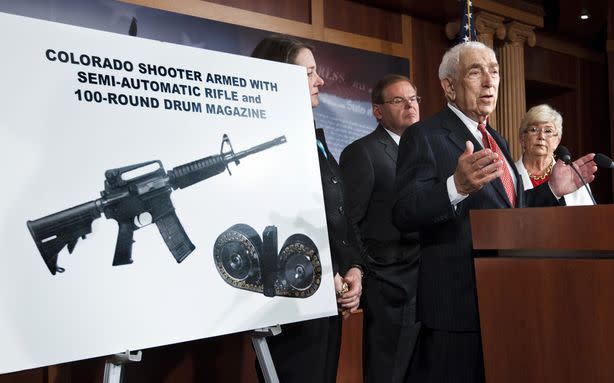How Senator Lautenberg's Death Makes the Senate Even Less Functional

On the third-to-last day that Senator Frank Lautenberg ever voted in the Senate, he joined with 53 of his colleagues to support a compromise on new gun regulations. His vote wasn't enough. Now, Lautenberg's death makes the prospect of revisiting that issue — and a number of other Democratic priorities — substantially trickier.
RELATED: Legislation Congress Wants After Bin Laden's Death
Gun legislation
Affect of Lautenberg's death: High
RELATED: How the GOP Fights with Itself Now
Take the gun legislation. The compromise proposal, which would have expanded background checks to include gun show and online sales, was part of a package that was postponed by Senate Majority Leader Harry Reid after the failed vote. It's expected to come back before the Senate at some future point.
RELATED: Lunchtime Vid: Palin Praises Arizona's Immigration Law
The proposal's sponsor, Joe Manchin of West Virginia, has reportedly been working to secure additional Republican support for the measure. In April, the measure came six votes short of overcoming the filibuster — though one of those six votes was a procedural one by Reid. So Manchin needed five votes to ensure it would move out of the Senate.
RELATED: Budget Progress Stopped, Despite Talk of Compromise
Until last night. Now, that number actually is at six — on perhaps the most hotly-contested legislation in the Senate so far this session. Every senator has already been lobbied extensively on it. Its significance is why Lautenberg came to the Senate to vote for it despite his illness. Finding six Republicans willing to reverse their previous decisions will take more than a television ad war.
RELATED: All Sides Think They're Losing the Jobs Debate
There's a wild card that applies to all discussion of what happens next: the possibility that Gov. Chris Christie will appoint an interim senator over the short term. If that person is a Republican (which he or she almost certainly would be), the new senator would be representing a heavily Democratic state, and might be willing to echo Lautenberg's vote on some issues, like, potentially, new gun control measures.
The "nuclear option" on filibusters
Affect of Lautenberg's death: Very high
As we noted last week, Reid and the White House wanted to use presidential appointments to fill vacant Appeals Court positions as an opportunity to revamp rules on filibusters. Right now, such appointments — once considered fairly routine — are regularly blocked, which has led to a three-person vacancy on the D.C. Circuit Court of Appeals. By nominating three people at once, the idea seemed to be, Senate Republicans could be forced to either hold a vote on one or two of the candidates, or demonstrate that the filibuster for appointments should be revised.
Such a revision would take only a simple majority vote in the Senate. But Reid was already toeing that line prior to Lautenberg's death. According to sources doing the counting, Reid could rely on 51 votes as of last week. Now, he's at 50. Three scenarios emerge:
The Senate remains as is. Right now, the Democrats hold a 52 to 45 advantage, with two independents who generally vote Democratic. If last week's count is correct, a vote held today would be, at worst, 50-49 — enough for passage.
Reid loses another vote. If Reid loses another vote, that calculus shifts. Last week, a senator deciding against changing the filibuster rules would have spurred a tie in the Senate — moving the tally to 50-50, and meaning that Vice President Biden could break the tie. If Reid loses that vote now, though, it flips to 49-50, and Biden isn't needed.
Christie appoints an interim senator. If Christie appoints an interim senator, Reid can consider that vote lost. There's very, very little chance that Christie wouldn't appoint a Republican, and there is basically zero chance that a Republican would back a plan giving the Democrats the ability to rubber-stamp appointments. In other words, a Christie appointment means that Reid may have to rely on Biden to break the tie by default — which it's not clear the White House would want to do.
Immigration
Affect of Lautenberg's death: Low
Last month, a bipartisan group of eight senators developed — and the Senate Judiciary committee approved — a proposal that will significantly revamp the rules around immigration. But, rather weirdly, the backers of the bill want to push to see that it gets 70 votes in the Senate. "Our goal is to get 70 votes. It is going to take a lot of work," Senator Chuck Schumer told Politico. It suggests that perhaps the group heard that the new filibuster-mandated 60-vote standard for approval was off by ten, but interpreted it in the wrong direction.
Lautenberg's death could make that mark even harder to hit. It's symbolic, to be sure, meant to demonstrate to the country — and the House of Representatives — that the bill is a priority for both parties. But what was once a push to get 15 Republicans on-board would now be a push for 16. Which likely would mean revisions to the bill intended to meet the concerns of those senators. Unless, again, Christie appoints a pro-immigration-reform interim senator who could be sworn in before the expected July vote.
It probably doesn't matter anyway. In a statement to The Hill, Schumer's spokesman, Brian Fallon, downplayed 70 as a hard number. "If we get 66, 67, 68 votes, Schumer and [immigration reform advocate Frank] Sharry will both be happy," Brian Fallon said.
Everything else
There is one thing that Lautenberg's death has no effect on: what happens to legislation in the House. The machinations in the Senate are interesting mostly because they're up for grabs. In the House, as always, the question isn't how a bill could pass, it's how conservative the final product is. Even if Frank Lautenberg had recovered fully, there's nothing he could have done to change that.

